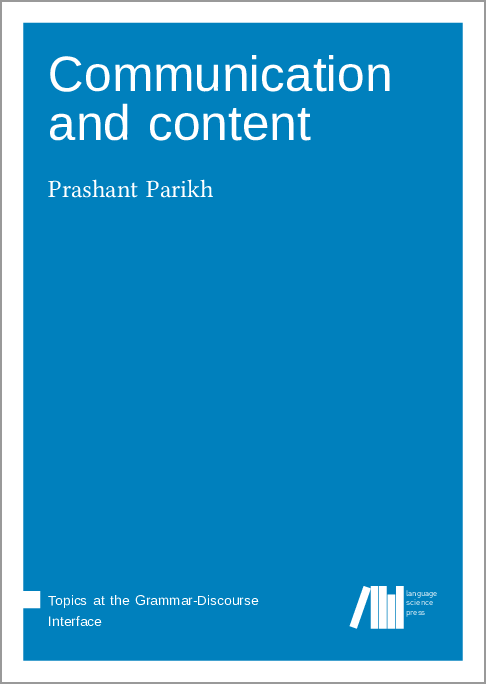We log anonymous usage statistics. Please read the privacy information for details.
Communication and content
Synopsis
Communication and content presents a comprehensive and foundational account of meaning based on new versions of situation theory and game theory. The literal and implied meanings of an utterance are derived from first principles assuming little more than the partial rationality of interacting agents. New analyses of a number of diverse phenomena – a wide notion of ambiguity and content encompassing phonetics, syntax, semantics, pragmatics, and beyond, vagueness, convention and conventional meaning, indeterminacy, universality, the role of truth in communication, semantic change, translation, Frege’s puzzle of informative identities – are developed. Communication, speaker meaning, and reference are defined. Frege’s context and compositional principles are generalized and reconciled in a fixed-point principle, and a detailed critique of Grice, several aspects of Lewis, and some aspects of the Romantic conception of meaning are offered. Connections with other branches of linguistics, especially psycholinguistics, sociolinguistics, historical linguistics, and natural language processing, are explored.
The book will be of interest to scholars in philosophy, linguistics, artificial intelligence, and cognitive science. It should also interest readers in related fields like literary and cultural theory and the social sciences.
"This book is the culmination of Prashant Parikh's long and deep work on fundamental questions of language and how they can be illuminated by game-theoretic analysis."
— Roger Myerson, 2007 Nobel Laureate in Economics, University of Chicago
"Prashant Parikh has, over the years, accumulated a substantial and impressive body of work on the nature of language, deploying the resources of game theory. Communication and content is a vastly ambitious culmination of this lifelong pursuit. It covers a tremendously wide range of themes and critically discusses an enormous range of writing on those themes from diverse intellectual traditions, as it systematically develops a game-theoretic account of content in the communicative contexts in which human linguistic capacities are employed, eschewing standard distinctions between semantics and pragmatics, and offering instead a highly integrated elaboration of the slogan “meaning is use”. It is a work that is at once creative yet conscientious, bold yet rigorously technical, systematic yet sensitive to contingency and context. It will abundantly reward close study."
— Akeel Bilgrami, Sidney Morgenbesser Professor of Philosophy, Columbia University
"Prashant Parikh has made fundamental contributions to the game-theoretic analysis of linguistic meaning. Communication and content summarizes and extends this important work, offering a truly novel approach to the strategic foundations of meaning. This approach finds a way out of the prison of methodological solipsism and opens up the study of linguistic meaning to scientific study."
— Robin Clark, Linguistics, University of Pennsylvania
"A pioneering attempt to work out things like literal meaning, modulation, enrichment, implicature, etc. in mathematical detail within a game-theoretic framework."
— François Recanati, Chair, Philosophy of Language and Mind, Collège de France
"Communication and content is the crowning achievement of a long line of research pioneered by Prashant Parikh. In this groundbreaking work Parikh introduces a fresh perspective on natural language pragmatics, by making a creative tie with game theory. Clearly written, Communication and content weaves together semantics, game theory, and situation theory to create a thought-provoking picture of natural language pragmatics. Every modern AI researcher interested in the foundations of natural language pragmatics owes it to him- or herself to become familiar with this picture."
— Yoav Shoham, Computer Science Department, Stanford University




